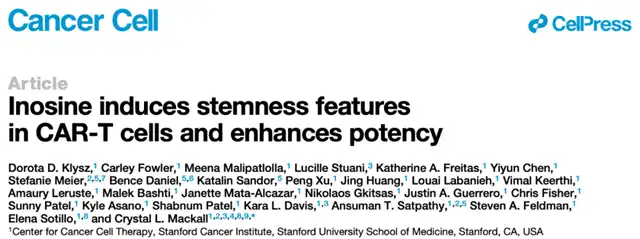Inosine Unleashes CAR-T Cell Potential: Enhancing Cancer Treatment Efficacy
- Normal Liver Cells Found to Promote Cancer Metastasis to the Liver
- Nearly 80% Complete Remission: Breakthrough in ADC Anti-Tumor Treatment
- Vaccination Against Common Diseases May Prevent Dementia!
- New Alzheimer’s Disease (AD) Diagnosis and Staging Criteria
- Breakthrough in Alzheimer’s Disease: New Nasal Spray Halts Cognitive Decline by Targeting Toxic Protein
- Can the Tap Water at the Paris Olympics be Drunk Directly?
Inosine Unleashes CAR-T Cell Potential: Enhancing Cancer Treatment Efficacy
- Should China be held legally responsible for the US’s $18 trillion COVID losses?
- CT Radiation Exposure Linked to Blood Cancer in Children and Adolescents
- FDA has mandated a top-level black box warning for all marketed CAR-T therapies
- Can people with high blood pressure eat peanuts?
- What is the difference between dopamine and dobutamine?
- How long can the patient live after heart stent surgery?
Inosine Unleashes CAR-T Cell Potential: Enhancing Cancer Treatment Efficacy
Adenosine, Unleashing the Potential of CAR-T Cells, Improving Cancer Treatment Effectiveness
Adenosine (Ado) is an immunosuppressive nucleoside that contributes to immune escape in the tumor microenvironment (TME). CD39 (encoded by the ENTPD-1 gene) and CD73 (encoded by the NT5E gene) convert ATP to adenosine, primarily mediating immune suppression through A2aR signaling.
Mouse CD4+ Treg cells co-express CD39 and CD73, partially mediating immune suppression by producing adenosine. In humans, most Treg cells express CD39, and CD73 expression can be induced by hypoxia-inducible factor 1-alpha (HIF1a). Tumor-reactive T cells are enriched in the CD39+ subset within the tumor microenvironment (TME). While some studies associate improved prognosis with a higher number of CD39+ tumor-infiltrating lymphocytes, functional studies indicate that CD39 marks dysfunctional, exhausted T cells.
CAR-T cell therapy shows high efficacy against refractory B-cell malignancies but is less effective against solid tumors, with T cell exhaustion being a major limiting factor.
On January 25, 2024, researchers from Stanford University School of Medicine published a study titled “Inosine induces stemness features in CAR-T cells and enhances potency” in the Cancer Cell journal.
The research suggests that inosine (INO) is an effective inducer of T cell stemness, significantly regulating T cell metabolism, enhancing functionality, and inducing epigenetic reprogramming. INO can also be used to manufacture potent CAR-T cell therapy products, promoting adenosine (Ado) metabolism to generate inosine (INO) in the tumor microenvironment (TME), offering a potential new approach to enhance anti-tumor immunity.

The study explores the biological characteristics of CD39 and the role of adenosine (Ado) in the functional impairment of exhausted human T cells. The researchers attempt to enhance CAR-T cell efficacy by engineering adenosine resistance.
Using an in vitro model of human CAR-T cell exhaustion, the research team observed that exhausted CD8+ CD39+ T cells co-expressed CD73, produced adenosine (Ado), and mediated Ado-related immune suppression through A2aR. To induce Ado resistance, the researchers attempted to enhance CAR-T cell functionality by knocking out CD39, CD73, or A2aR, observing only mild phenotypic and transcriptional changes.
In contrast, overexpressing membrane-anchored adenosine deaminase (ADA), which converts adenosine (Ado) to inosine (INO), significantly altered the transcriptome towards stemness and enhanced CAR-T cell functionality. Similarly, CAR-T cells exposed to INO induced the expression program of stemness-related genes and enhanced CAR-T cell functionality.
Single-cell analysis revealed that inosine (INO) induced profound metabolic reprogramming, reducing glycolysis, increasing glutamine breakdown, polyamine synthesis, and oxidative phosphorylation, and reprogramming the epigenome towards greater stemness. Clinical-scale manufacturing using INO produced enhanced potency CAR-T cell products meeting clinical dosing standards, demonstrating improved efficacy in animal models.
These findings suggest that INO is an effective regulator of CAR-T cell metabolism and epigenetic stemness reprogramming, providing a platform for manufacturing enhanced potency cellular therapies.
Paper Link: https://www.cell.com/cancer-cell/fulltext/S1535-6108(24)00008-4
Inosine Unleashes CAR-T Cell Potential: Enhancing Cancer Treatment Efficacy
(source:internet, reference only)
Disclaimer of medicaltrend.org
Important Note: The information provided is for informational purposes only and should not be considered as medical advice.



